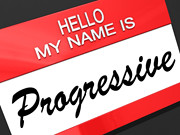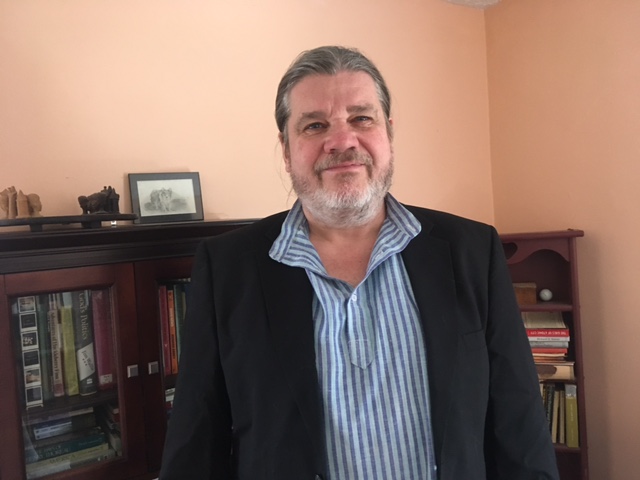As one of democracy's greatest friends, George
Orwell, memorably taught us, words matter. And though we need caution in applying--or even reading--word labels, the simple fact is that labeling is one of
the KEY functions of words. A word like "democracy," for example, serves as a
useful shorthand designating a useful concept (or set of related concepts) that
it would be time-wasting and tedious always to explain. 
by One Way Stock
by One Way Stock
Obama supporters need not apply.
And because words acquire emotional connotations,
they perform an even broader service, giving us some immediate hint of whether
the word's designated object is helpful or harmful, good or bad. Now, Winston
Churchill was certainly onto something when he said, "Democracy is the worst
form of government except for all the others that have been tried." But seeing
HOW bad the results are when democracy is utterly scorned--the mass graves of
the twentieth century offer ample testimony--has deservedly given the word "democracy"
good emotional vibes. We spontaneously LIKE democracy.
Word meanings--but above all, word connotations--can change
over time. Churchill's cynical defense of democracy, for example, is rooted in
his vivid scholarly awareness of philosophers like Plato, who considered
democracy "mob rule" and held it in utter contempt. A similar ambivalence haunted
our Constitution's chief framer James Madison as he sketched out the founding
document for a new representative democracy--the "representative" part stemming
not just from the impracticality of assembling a vast nation's citizens, but
from a scholarly fear of rule by ignorant mobs dating back at least to Plato.
Perhaps the most careful users of political words
are honest scholars, people vividly aware of how words' literal meanings and
connotations have changed over time. Such people--who needn't be professional linguists or lexicographers--are often politically committed
writers like Orwell, who understand the dangers to beneficial political thought
and action when imprecise, misleading, or even outright perverted uses of words
start to dominate public speech. Such deep perversion, I intend to argue,
underlies today's twisted application of the honorable word "progressive" to MERE Obamaheads.
"Progressive," you see, could play a highly useful
role in today's political discourse, as a uniting and identifying label for the
pro-democracy left. "Liberal" has already been successfully smeared as the "L-word,"
and the word's economic application to a freedom for markets that often
EXCLUDES freedom for peoples had already made it politically problematic. But
even worse, it suggested knee-jerk, politically correct positions on divisive
social issues--a suggestion easily exploited by the right to vilify "those
liberals." "Progressive" carries none of this historical baggage, being
associated rather with broad populist movements (which, in the day, included
many REPUBLICANS) to restrain the greed and excessive political influence of
robber barons and their out-of-control corporations. In these days of corporate-strangled democracy, that fact alone should magnify the progressive label's worth.
"Progressive" also, again largely due to its
historical associations, reflects a political pragmatism, a focus on goals and
freedom from radical ideologies, that makes it ideal for addressing the vaguely
leftist mainstream--the sort of folks largely found in today's Democratic Party.
Given the word's homegrown U.S. associations--with a movement that even included
Republicans--it's pretty hard to tie the word with anarchism, socialism,
communism, or any of the other foreign-born "isms" that make our mainstream
scurry like skittish rabbits. Of course, given the appalling
rightward drift of today's Democrats under Obama, even the type of
progressive program once embraced by many Republicans can seem pretty radical.
But that, again, is why need a solidly un-scary label for the pro-democracy left.
"Progressive" also, in both denotation and
connotation, has the value of suggesting movement toward a desirable place,
real REFORM--a breaking of political gridlock and escape from moral quagmire. Indeed,
I think the moral aspect here is
crucial, for without it, emphasis on progress simply degenerates into worship
of the latest technology or the empirically dubious historical theory of things getting better all the time. Thoreau's incisive comment "improved
means to an unimproved end" brilliantly dismisses technology worship, and while
there ARE certain aspects where things are provably getting better (like
increase of human longevity), it's rather dubious to accuse a human race that
recently perfected nuclear weapons and seems hell-bent on destroying itself
through climate change of fulfilling some "ever upward" historical law.
But there is one--predominantly moral--aspect of
both progress and the word "progressive" I'm deeply inclined to embrace. In
Alexis de Tocqueville's classic analysis of America's young democracy, Democracy in America, he early laid down
one of his guiding principles in a striking phrase: "the providential democratization of the world."
In fact, Tocqueville took such a deep interest in our U.S. democratic
experiment precisely because he saw such experiments as the inevitable future
of the whole political world. Now Tocqueville, like Madison earlier and Churchill
later, certainly grasped the potential dangers of "mob rule," and if he tried
to befriend democracy, he did so precisely because he saw its spread as
inevitable--as indeed, ordained by God. But seeing it as ordained by God, he
also saw its potential deeply beneficent aspect--provided it was guided by
informed, virtuous human wills. For if properly directed, democracy at its best
could mean the mass release of human beings from drudgery and the prospect of leading
self-directed, fulfilling human lives for everyone, not just born aristocrats like
himself.
I see nothing but benefit in associating Tocqueville's
enlightened reflection on the real, deeper meaning of progress in history with
our current embrace of the word "progressive." Indeed, developments in technology
offer far vaster prospects of mass release from drudgery and living of
fulfilling lives than Tocqueville could have imagined--PROVIDED we apply them
democratically. Herein lies my bitter quarrel with the likes of Barack Obama
and Hilary Clinton for commandeering the word "progressive." It's witnessing desecration--like watching someone piss in the Holy Grail--to hear one of the potentially noblest words
in our lexicon applied to a vision as ungenerous, militaristic, and corporate-corrupted as Barack and Hilary's.
As Orwell memorably illustrated in 1984 and Animal Farm, perversion of language is one of the intimate,
telltale signs--and one of the best-loved techniques--of burgeoning fascism. Given
what "progressive" has meant historically--or what, filtered through a
prism like Tocqueville's, it could mean for our times--it's pretty hard to find anything progressive in the
president-sponsor of the PRISM program. Simply the same dedication to worsening economic inequality, to
relentless corporate grip on public policy and media, to perverse climate
change policy, to servile obedience to the Israel lobby, to cancerous
growth of the military-industrial-surveillance complex, and to association
of legitimate dissent with domestic terrorism we saw under Bush--but masked by
a sneakier, more deceptive (and therefore more fascist) rhetoric. Besides
rescuing a vitally useful term, I view my stance against the unjust
commandeering of the word "progressive" by mere Obama supporters as a long-overdue
revolt against fascist perversion of language. On this anniversary of a nation
born to foster democratic progress, I hope many fellow members of the American
left will do the same.
To join a conversation with fellow Americans pledged to restoring our nation's lost democracy, please visit the Time to Restore Democracy Facebook page at Facebook.com/WhoseVoiceOurVoice





